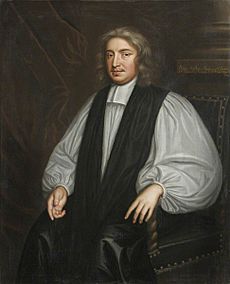Oxford Philosophical Club facts for kids
The Oxford Philosophical Club was a group of smart people, including scientists, mathematicians, and doctors. They met in Oxford between 1649 and 1660. The group was led by John Wilkins FRS, a very important thinker of his time.
This club was special because its members were able to work together even though there were big political disagreements happening in England. They met weekly and focused on experiments and new ideas. The club was formally set up and even worked on projects in Oxford's libraries. This group was very important because many of its members later helped create the famous Royal Society of London.
Wilkins was the head of Wadham College at Oxford. Because of this, the group was also known as the Wadham Group. But it wasn't just for people from that college; many others joined too. Some members, like William Petty, Jonathan Goddard, and John Wallis, had already been part of a similar group in London.
Sometimes, people also call this group the Oxford Philosophical Society. But that name can also refer to other groups that came later.
What They Believed and Discussed
Many members of the Oxford Philosophical Club shared similar ideas. For example, they often disagreed with the views of another famous thinker named Thomas Hobbes. From 1654, they worked together to protect the university from outside pressures to change things too much.
Wilkins and another member, Seth Ward, wrote a book called Vindiciae academiarum in 1654. This book was part of a big debate between Hobbes and Wallis about how universities should be run. Wilkins and Ward wanted to keep a calm approach to difficult topics. They were interested in developing a type of science that explained how the world worked through natural laws, but also believed that God had a plan for everything.
Who Was Involved
Many bright minds were drawn to Oxford because of John Wilkins. Some important people who joined the group include Ward, William Neile, Laurence Rooke, and Christopher Wren. Others who became involved were Ralph Bathurst, Thomas Willis, and Matthew Wren.
A very famous scientist, Robert Boyle, moved to Oxford around 1655 or 1656 and joined the club. When Wilkins moved away in 1659, Boyle helped keep the meetings going. Around 1652, Wilkins worked hard to make Wadham College a center for science. He brought in experts like Ralph Greatorex and found ways to pay for scientific equipment. Eventually, Wadham College even had its own laboratory.
Wilkins continued to gather new members, including Richard Lower, Walter Pope, William Holder, and Nathaniel Hodges. Robert Hooke, another very important scientist, also became involved through his work with Willis and Boyle. It's also thought that Daniel Coxe was part of the club in the late 1650s.
 | Mary Eliza Mahoney |
 | Susie King Taylor |
 | Ida Gray |
 | Eliza Ann Grier |


